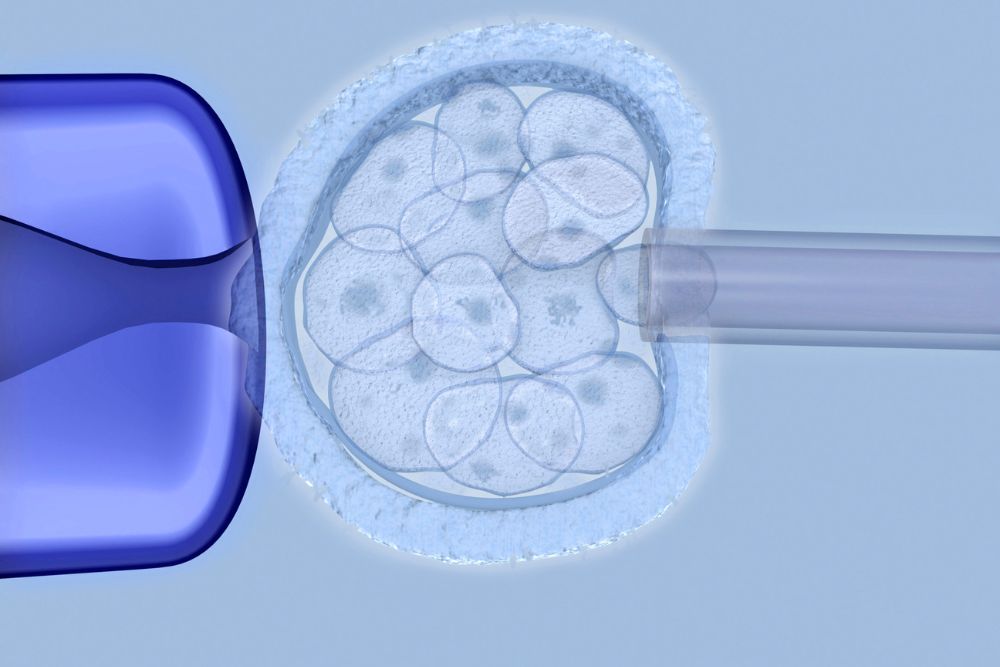Trying to conceive often means learning to cope with uncertainty. For individuals with an inherited genetic disorder, the idea of having children can feel like an even bigger big question mark.
Thankfully, modern fertility science offers insights that can provide greater confidence and control over the future of your family. One of these tools is preimplantation genetic testing (PGT), a method of screening embryos for abnormal chromosomes or genes before transferring them into a uterus. Adding PGT to your fertility treatment plan can help to reduce the risk of miscarriages, as well as the likelihood of passing down a genetic illness such as Huntington’s disease.
PGT and Huntington’s Disease
Huntington’s disease is a hereditary disorder that affects about one in every 10,000 to 20,000 people in the United States. Huntington’s causes the breakdown of neurons in parts of the brain, leading to physical, cognitive, and psychological difficulties. Symptoms include uncontrolled movements in the face, torso, and extremities; difficulty speaking, eating, or swallowing; intense fatigue, loss of judgment and problem-solving skills; depression, and mood swings. These symptoms are cumulative and grow more severe over time, eventually requiring full-time care. While medications exist to manage the symptoms of Huntington’s disease, there is no cure or treatment for the damage it does to the brain. Beginning from the onset of symptoms, Huntington’s is usually fatal after about 10 to 30 years.
Although the symptoms of Huntington’s disease (sometimes called HD) do not typically present themselves until after age 30, the anomalous gene that causes HD is present from conception. For this reason, it is possible to detect HD in an embryo. The same is true for a number of genetic disorders that result in serious illness later in life, as well as those that can make it more difficult for an embryo to survive.
Not only can detection of these hereditary illnesses help parents to make informed decisions about their future, but in some cases — such as Huntington’s disease — it can help to prevent an incurable disease from being passed onto future generations.
How can preimplantation genetic testing help?
If you’re planning to conceive using in-vitro fertilization (IVF), then you have the opportunity to screen the embryos created for certain genetic abnormalities immediately after fertilization. One type of PGT, PGT-M, is specifically designed to detect monogenic conditions: diseases caused by a variation in a single gene, like HD and sickle-cell anemia. Other types of PGT look for extra, absent, or translocated chromosomes, any of which may jeopardize the embryo’s ability to successfully implant and grow.
While some diseases, including HD, are inherited directly from a parent who carries the gene, many others are the result of one or both parents contributing abnormal chromosomes to an embryo. This is not unusual, and is nothing to be ashamed of — no one produces exclusively healthy sperm or eggs. However, egg and sperm health and viability can decline as prospective parents age. With your PGT results in hand, you and your doctor can make more informed decisions about which embryo or embryos to transfer.
Should I get preimplantation genetic testing?
Because of the many strong advantages of applying PGT to your IVF cycle, the Prelude Network considers it a standard of care. Of course, we encourage you and your doctor to carefully consider whether it’s right for you. A few factors that may weigh into your decision:
- If either parent is a carrier or suspects they might be a carrier of a serious genetic disorder, such as Huntington’s disease, PGT is an effective way to prevent passing on those genetic defects on to your child. There are even grants available for PGT-IVF through HelpCureHD, a foundation that supports families affected by HD on their fertility journeys.
- PGT is also recommended for parents who have had recurrent miscarriages, as screening for healthy embryos can increase the likelihood of a successful pregnancy.
- For those who are attempting to carry a child and are over the age of 38, PGT can help to manage the risk of producing embryos with genetic abnormalities.
- Using PGT to individually select the most viable embryo for implantation also avoids one of the most common risks of IVF: unexpected multiple pregnancies.
On the long journey from fertilization to pregnancy to birth, parents are confronted with countless unknowns and variables. At each step along the way, having the most complete information is invaluable to providing your child with the best possible future, and providing you with some peace of mind.
Request a consult with an expert about how genetic testing might enable your own fertility journey.
